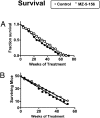Effects of a growth hormone-releasing hormone antagonist on telomerase activity, oxidative stress, longevity, and aging in mice - PubMed (original) (raw)
Effects of a growth hormone-releasing hormone antagonist on telomerase activity, oxidative stress, longevity, and aging in mice
William A Banks et al. Proc Natl Acad Sci U S A. 2010.
Abstract
Both deficiency and excess of growth hormone (GH) are associated with increased mortality and morbidity. GH replacement in otherwise healthy subjects leads to complications, whereas individuals with isolated GH deficiency such as Laron dwarfs show increased life span. Here, we determined the effects of treatment with the GH-releasing hormone (GHRH) receptor antagonist MZ-5-156 on aging in SAMP8 mice, a strain that develops with aging cognitive deficits and has a shortened life expectancy. Starting at age 10 mo, mice received daily s.c. injections of 10 μg/mouse of MZ-5-156. Mice treated for 4 mo with MZ-5-156 showed increased telomerase activity, improvement in some measures of oxidative stress in brain, and improved pole balance, but no change in muscle strength. MZ-5-156 improved cognition after 2 mo and 4 mo, but not after 7 mo of treatment (ages 12, 14 mo, and 17 mo, respectively). Mean life expectancy increased by 8 wk with no increase in maximal life span, and tumor incidence decreased from 10 to 1.7%. These results show that treatment with a GHRH antagonist has positive effects on some aspects of aging, including an increase in telomerase activity.
Conflict of interest statement
The authors declare no conflict of interest.
Figures
Fig. 1.
Effects of MZ-5-156 on life expectancy. (A) Effects on fraction survival for all mice. (B) Surviving mice before change in proportional hazards at about day 55.
Fig. 2.
Effects of MZ-5-156 on cognition. (A) Improvement in acquisition (learning) but not retention (memory) at age 12 mo after 2 mo of treatment. (B) Improvement in learning as measured by lever press in 12-mo-old mice after 2 mo of treatment. (C) Improvement in memory in the step-down passive avoidance in 14-mo-old mice after 4 mo of treatment. (D) Improvement in memory as measured by object recognition in 14-mo-old mice (4 mo of treatment) but not at 17 mo (7 mo of treatment).
Fig. 3.
Effects of MZ-5-156 on measures of brain oxidative stress. Increased GSH (A) and decreased GPx (B) indicate decreased oxidative stress. MDA (C) and GR (D) were unchanged.
Similar articles
- Decrease in telomerase activity in U-87MG human glioblastomas after treatment with an antagonist of growth hormone-releasing hormone.
Kiaris H, Schally AV. Kiaris H, et al. Proc Natl Acad Sci U S A. 1999 Jan 5;96(1):226-31. doi: 10.1073/pnas.96.1.226. Proc Natl Acad Sci U S A. 1999. PMID: 9874800 Free PMC article. - Effects of acute and chronic administration of a new potent antagonist of growth hormone-releasing hormone in rats: mechanisms of action.
Kovacs M, Zarándi M, Halmos G, Groot K, Schally AV. Kovacs M, et al. Endocrinology. 1996 Dec;137(12):5364-9. doi: 10.1210/endo.137.12.8940358. Endocrinology. 1996. PMID: 8940358 - Growth hormone releasing hormone (GHRH) signaling modulates intermittent hypoxia-induced oxidative stress and cognitive deficits in mouse.
Nair D, Ramesh V, Li RC, Schally AV, Gozal D. Nair D, et al. J Neurochem. 2013 Nov;127(4):531-40. doi: 10.1111/jnc.12360. Epub 2013 Jul 19. J Neurochem. 2013. PMID: 23815362 Free PMC article. - Growth hormone releasing hormone.
Grossman A, Savage MO, Besser GM. Grossman A, et al. Clin Endocrinol Metab. 1986 Aug;15(3):607-27. doi: 10.1016/s0300-595x(86)80012-3. Clin Endocrinol Metab. 1986. PMID: 2429796 Review. - Do deficiencies in growth hormone and insulin-like growth factor-1 (IGF-1) shorten or prolong longevity?
Laron Z. Laron Z. Mech Ageing Dev. 2005 Feb;126(2):305-7. doi: 10.1016/j.mad.2004.08.022. Mech Ageing Dev. 2005. PMID: 15621211 Review.
Cited by
- Somatotropic signaling: trade-offs between growth, reproductive development, and longevity.
Bartke A, Sun LY, Longo V. Bartke A, et al. Physiol Rev. 2013 Apr;93(2):571-98. doi: 10.1152/physrev.00006.2012. Physiol Rev. 2013. PMID: 23589828 Free PMC article. Review. - Growth Hormone-Releasing Hormone in Endothelial Inflammation.
Barabutis N, Akhter MS, Kubra KT, Jackson K. Barabutis N, et al. Endocrinology. 2022 Dec 19;164(2):bqac209. doi: 10.1210/endocr/bqac209. Endocrinology. 2022. PMID: 36503995 Free PMC article. Review. - Molecular regulation of telomerase activity in aging.
Nicholls C, Li H, Wang JQ, Liu JP. Nicholls C, et al. Protein Cell. 2011 Sep;2(9):726-38. doi: 10.1007/s13238-011-1093-3. Epub 2011 Oct 6. Protein Cell. 2011. PMID: 21976062 Free PMC article. Review. - Growth hormone-releasing hormone and its analogues in health and disease.
Granata R, Leone S, Zhang X, Gesmundo I, Steenblock C, Cai R, Sha W, Ghigo E, Hare JM, Bornstein SR, Schally AV. Granata R, et al. Nat Rev Endocrinol. 2024 Nov 13. doi: 10.1038/s41574-024-01052-1. Online ahead of print. Nat Rev Endocrinol. 2024. PMID: 39537825 Review. - Antinflammatory, antioxidant, and behavioral effects induced by administration of growth hormone-releasing hormone analogs in mice.
Recinella L, Chiavaroli A, Orlando G, Ferrante C, Marconi GD, Gesmundo I, Granata R, Cai R, Sha W, Schally AV, Brunetti L, Leone S. Recinella L, et al. Sci Rep. 2020 Jan 20;10(1):732. doi: 10.1038/s41598-019-57292-z. Sci Rep. 2020. PMID: 31959947 Free PMC article.
References
- Lieberman SA, Hoffman AR. The somatopause: Should growth hormone deficiency in older people be treated? Clin Geriatr Med. 1997;13:671–684. - PubMed
- Laron Z. Do deficiencies in growth hormone and insulin-like growth factor-1 (IGF-1) shorten or prolong longevity? Mech Ageing Dev. 2005;126:305–307. - PubMed
- Liu H, et al. Systematic review: The safety and efficacy of growth hormone in the healthy elderly. Ann Intern Med. 2007;146:104–115. - PubMed
- Dominguez LJ, Barbagallo M, Morley JE. Anti-aging medicine: Pitfalls and hopes. Aging Male. 2009;12:13–20. - PubMed
Publication types
MeSH terms
Substances
LinkOut - more resources
Full Text Sources
Other Literature Sources


